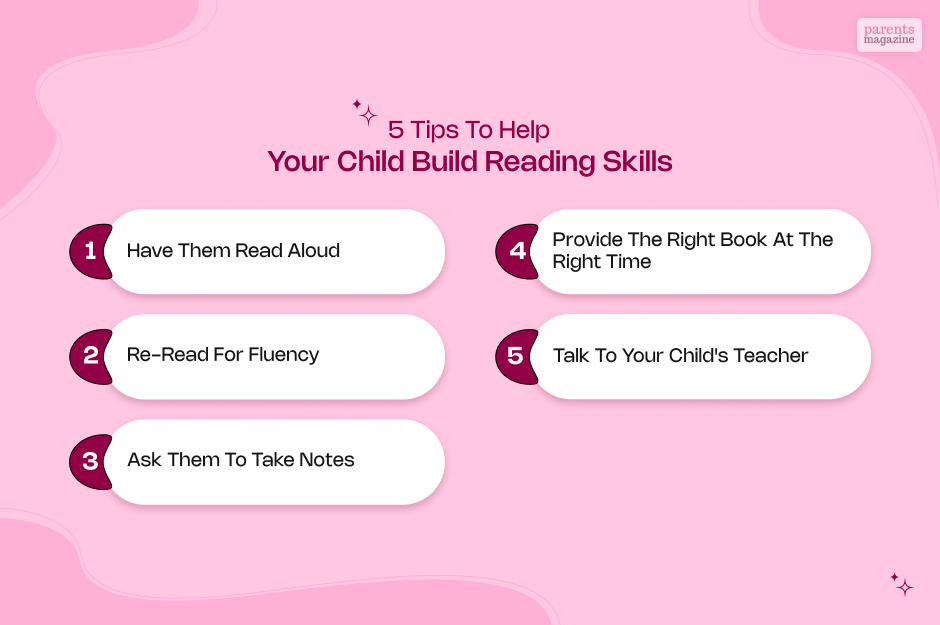
How to Improve the Reading Skills of a Child?
Reading habits – that’s one good thing to pass down to your child.
It’s the single most important foundation to help your child build their life. Reading not only helps them become smarter but also improves their academics. It’s also the access to help for their mental development and foundation for becoming a better person.
As parents, we often forget that reading shouldn’t be imposed on children. They should have fun while reading, not feel anxious, and find excuses to get off studying.
While pushing them into the habit of reading voraciously, might seem too provocative, it doesn’t help.
As a parent, it’s your responsibility to help them build their reading muscles. It starts with providing them with an environment where your child finds enjoyment in reading.
In this article, we have listed the best tips to help them develop a reading habit –
Improve Reading Skills: The Long-Term Approach

Helping your child takes time. We have tips you can use in the short term to help them improve their reading skills and help in academics.
But, if you look at the bigger picture, you must help them build a lifetime mechanism. Here are some mindsets that will help you plant the seed of an avid reader in your child –
Take a Routine Approach
Children do what they see their parents do. Children have a knack for mimicking whatever their parents do. Several child psychologists think that children observe more than grown-ups.
That’s why, as grown-ups, it’s our responsibility to showcase the right behaviors in front of the children. Parents can present themselves as avid readers in front of their children to showcase the importance of reading in their lives. Spending routine reading with your child is a great way to help them become interested in reading.
You can even try reading to help them develop their reading skills. This should help children learn more words, decipher difficult sentences, and expand their vocabulary. Reading sessions with your child also help improve their comprehension skills.
This is as simple as telling them bedtime stories for ten minutes before bed. If your child is just getting introduced to books, try reading a picture book with them, helping them build their visual memory. Little by little, you shift the responsibility to read to your child.
Don’t stop participating as they start their habit of reading. If you back off now, they will lose their motivation to read. The frequency of your reading with your child will reduce, and that’s ok. You must keep tagging along until they are comfortable reading alone. But even if they are reading alone, help them out if they are feeling stuck at some point.
Build a World of Books
Books have to be easy to reach for your kids to develop strong reading skills. It’s all about building a world where books of different types attract them. Several types of research suggest that having books all around the house helps your child build reading habits and improve reading skills.
Kids find the best learning and knowledge when not looking for them. You can build a world of surprises by putting books everywhere in the house. Put books on the bookshelves, in the bathroom, the car, the living room, and almost everywhere you think they fit.
It works just like advertisements. Books should first grab your kids’ attention span so that they feel interested in reading. We live in a world where we are always surrounded by technology, and social media reigns supreme. Spending 1 hour on Instagram is easier nowadays than reading a page. It’s difficult to win your child’s attention unless you have books showcased at every corner of the house.
You can also create a user account for your child in the tab or the computer they use where you put lots of eBooks. So, whenever they access technology, they have something to read.
Nurture the Growing Reader
Once you routine it, time track it, and pass on that interest for reading what’s left? For the next step, help your child grow the interest in reading they have developed. You need to nurture a seed you have planted in them. To help them develop their reading skills, help your child find the book they want to read.
After months of helping your child develop their taste in books, you can ask about the specific type of books they want to read. Their answers can be comic books, mysteries, dramas, manga, poetry, or novels.
You can talk about the different types of books they love to read. Help them carry their interest forward by helping them find books to their taste. If they love to read poetry, you can help them find two or three specific poets and help them tap into their interests.
If they are more into encyclopedias and information, it will help them find books to improve their knowledge. A strong and helpful way to build your child’s reading skills is to tap into their love for a subject matter. This can be anything from space to sci-fi novels.
Introduce Variety
According to several types of research, once your child starts loving to read, they will want to go beyond their current interest and explore., They might be into comic books in a few months if they are reading nursery stories now. That’s why it’s important to keep expanding their library.
An improved reading skill isn’t just a skill. It’s the result of your trying out different books. It includes poetry, non-fiction, and other genres of books that are piled up inside their head by love and not by pressure.
Help your child broaden their favorite books by not burdening them with what you expect from them. Instead, by introducing different types of books, they can learn to engage with other mediums like newspapers, books, television series, blogs, and more.
As they build the habit of making reading part of every day, you’ll see them find newer ways to access more books and broaden their horizon.
Lead by Example
Again, coming back to square one, your kid loves to imitate whatever you do. It starts with the different habits you build and nurture over the years.
If you build a habit of reading over procrastinating, your child can take that from you. If you go to bed with a book, your child will probably do the same. They will mimic your reading habits, and someday, they’ll fall in love with the books you spend more time with.
It’s incredibly important to build a habit of reading where your child also feels prompted to read. Childhood years are the time when you can build yourself as a role model for your child. So, don’t miss out on this opportunity. It’s the prime time to be a hero in your child’s eyes.
5 Tips to Help Your Child Build Reading Skills

Reading is a habit which must be nurtured among children, especially when they are growing. This is quite important because the skill of reading not only helps you intellectually but also contributes to your overall personality in terms of personal and professional growth. Here are some short and quick tips that should help improve your child’s reading skills –
1. Have Them Read Aloud
If your child is in nursery, it’s probably best for them to read aloud. This habit will help them associate their reading skills with pronunciation. With improved phonological awareness, your child will have more confidence in communicating with others as they grow up.
2. Re-read for Fluency
Once your child starts reading aloud, you’ll hear them mispronounce several words. This gives you the benefit of correcting them. Once their pronunciation is corrected, you can ask them to reread the same lines to help them gain fluency.
3. Ask them to take notes
Taking notes is one of the best practices for learning. Once your child has gone through a passage, ask them to take notes of whatever they learned. Let them make a summary of the entire reading session. You can also ask them to shorten it in bullet points and make short sticky notes they can put up on the wall.
4. Provide the Right Book at the Right Time
you must provide books to your child that they love to read. It’s also great to introduce them to new books. But don’t go overboard by providing books that don’t fit their age. Always allow your child to read age-appropriate books.
Provide books of different difficulties as per their level of comprehension. Understand the type of book they can digest for their age. Then, provide options based on their capabilities.
5. Talk to Your Child’s Teacher
If your child struggles to read and utter words while reading, they might need help with vocabulary and phonic skills. It’s best to discuss the issue with their teacher to find a solution that best suits your child.
Read, But Why?
Reading is no doubt important for many reasons. But unless your child loves it, there’s no benefit in forcing them to do so. Make reading fun for your child. Improving something requires dedication and passion. If your child feels passionate about doing it, they will only finish ten pages a day or the syllabus before the exam. The same applies when you are trying to help them improve their reading and memorization.
All it takes is a purpose. Help your child build a purpose that drives them to read. For every child, that purpose is unique. As a parent, you must figure out your child’s purpose for reading. Is it just good grades? Think.
You May Like To Read:
Already have an account?
Sign In
Create your account
User added successfully. Log in









